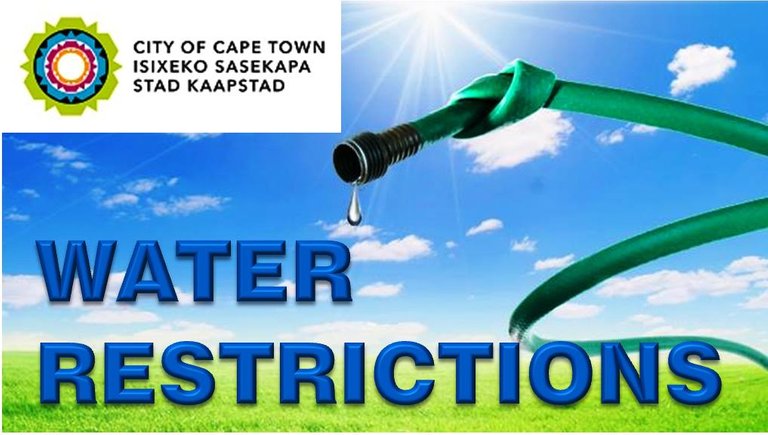
It has been about 2 weeks since I posted. In that time a lot has happened: sickness, tight deadlines, family responsibilities, neighbourhood watch duties, puppy classes and of course, water-related issues since I am in Cape Town. In upcoming posts I want to share some tips from the behavioural classes I take with my teenage puppy; I phrase it that way because I am adjusting my behaviour as a dog mom and that filters down the lead to Delcie. However for now, I am just going to write a little about my daily experiences in the most severe drought this city has ever experienced in recorded history.
People like me, who are privileged enough to live in a home with running water and electricity, have been taught a lesson in empathising with Cape Town's many shack dwellers who have to collect their water and use public toilets. In some ways the drought has saved me time and money. My family's water bill is much lower and I don't need to worry about watering the garden with a hosepipe because it is actually a good thing if your neighbours can see your grass is yellow. Instead of looking apathetic, you are doing your bit saving water. That being said, when we have some rain water or grey water available, I am strengthening my arms by carrying buckets to special plants that deserve to be kept alive. Unfortunately our new pincushion protea was not sufficiently established to survive the drought. Proteas cannot stand phosphates so we never watered them with grey water but we did use rainwater which had been standing for a few days and I wonder whether that didn't contain more algae than they could handle as these plants are built for acidic, nutrient poor soil.
So where does this grey water come from? I alternate between keeping up only essential personal hygiene and a sponge bath every 2nd day, which seems to use less water than a shower. The essentials include brushing my teeth and washing my hands. The used water is collected in large plastic bins that can hold about 30 l of water. Grey water systems are available but expensive so I am my own manual grey water system. I use an Eco Egg (a brilliant product I should review) to wash my laundry without introducing harsh chemicals into the water. The washing machine's out pipe now sits in a large tub but if the water pressure goes up, our floor gets a generous wash so it needs supervision. All this grey water is used to flush toilets and the remainder is used on the garden.
The one area where we don't compromise on hygiene is the kitchen. Listeriosis is a food borne disease that is spreading throughout South Africa at the moment so we have to wash our cutlery properly and use separate chopping boards for different kinds of food. If we can collect grey water from the kitchen, it also goes onto the garden. Excess food and sauces are scraped off plates with kitchen towels to keep the washing water cleaner for longer.
My family hasn't stockpiled large quantities of bottled water because it is going to cause a huge amount of plastic waste. The bottles we have bought are going to be recycled as gardening pots when we no longer need them. We also have a jug filter to make the municipal water taste less like whatever chemicals have been introduced into the dregs of our shallow dams. I try to avoid paper plates and disposable cutlery as I don't think creating more waste is a good idea in the long term when it doesn't take much water to wash cutlery and crockery. Some people are buying large containers and trolleys for transporting water if we reach day zero (when our taps will run dry and we will have to visit collection points). Again, these trolleys are expensive so I am just going to use a wheelbarrow and our existing containers if we get to that point.
In spite of our efforts I am probably still going to be fined for excessive water use this month because I found a burst pipe in the driveway. It must have been going for about 1h 30 mins so it was tragic to see all that precious water running down the road. I'm waiting on the plumbers to help me with that soon. After that, I will be visiting the municipal offices with the plumbers' report in the hope of a rebate.
Thanks for your interest in the drought. It's the sort of event that is becoming more common with global warming and cities around the world can learn from one another.
~ Colleen